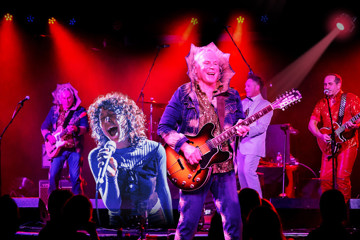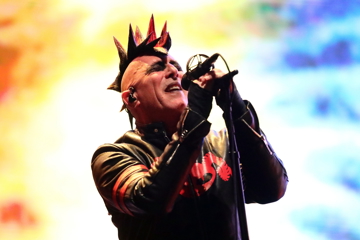INXS Holding Broadway Meetings After TV Show Success
CM Murphy tells theMusic where he is taking INXS after their homeland reinvention


The love for INXS has been immense in Australian over the past few weeks, but their manager Chris CM Murphy is dead serious about replicating it overseas and has a plan to do so.
“At the end of the day, what our job is to do – Universal Records, Universal Publishing and myself – is to create an event,” he says. “You can take these products and get them released, or you can come up with a strategy as to how you can make an impact.”
Murphy is off to Paris (where his teenage son lives) and London this week as he and Universal look at the next step in showcasing INXS and the Never Tear Us Apart miniseries.
Don't miss a beat with our FREE daily newsletter
“Universal are flying in all the heads from around the world for a viewing on the 26th, then all the broadcasters are flying in on the 27th,” he says. “Then I fly off to New York for meetings with all the Broadway producers, then I fly to Nashville to present INXS songs to the Nashville crowd, then to LA for a big, big viewing there for all the industry and broadcasters – my job is to take the proof that, even though they're an Australian band, they're an international brand.”
Shooting this high has always been Murphy's goal since resuming his work with the band back in 2008, not that many people expected it.
“When I came back, I had people laughing at me, to my face, saying, 'What are you gonna do with INXS? Take them back to the pubs?' That was the sarcasm and cynicism I was faced with. I didn't even bother explaining it to people.

“We've just got to apply our strategy, do it systemically, strategically and with discipline. I think the UK is going to explode, Michael was in the public's eye for months and months on the front page of the papers. I'm hoping we can roll that into France and Germany, I think we'll have a lot of interest in South America where the band's fan base just keeps growing and growing, and then after that the big one to tack – and do very carefully – is the US. If we can get that right and emulate what we've done here… well that's probably when I'll have a rest.
“Now's the time to not let the blood run to your head, just stay calm and keep making sure we keep making the right decisions.”
In his book Murphy, the manager tells the story of going to see the popular musical Jersey Boys – which is based on the story of The Four Seasons – for the first time and being blown away by it. He looked at shopping an INXS musical at the time, but by this stage just about every other major band was doing the same.
“I was talking to people in Broadway five years ago, it was one of my first strategies, but at that time Jersey Boys had just exploded and everyone was doing stage plays, so I decided to pull out. I knew that was not the time, so I pulled out with a view to come back,” he says.
An article in The Australian a couple of weeks ago made Murphy stop and think about his approach to management; he said he was tipped off that a few people in the industry were going to slam his methods of operation in the article and it gave him cause for concern. Briefly.
“I'd been really worried about this approach; the way that people, after decades, have been taking to my style and the way I work. I've had to really think about it long and hard,” he says. “But my conclusion was quite simple; I'm not going to change my style or my approach, because my job is to protect artists, my job is to get the best job for my artists, my job is to make sure no one runs right over the artists – if that means people then call you a prick, or whatever it may be, then I'll accept that. So long as no one calls me a thief – that's different.”
Murphy says he's not a particularly self-congratulatory person and he shirks the spotlight whenever possible – he didn't want his character to be in the Never Tear Us Apart series – but said a natural disaster served to remind him of his achievements for the very first time.
“The reality is, I didn't really look back at my life at any particular stage. Even through all of INXS' success, I didn't roll in the glory of it, in fact I never even spoke about INXS, I just went on to do what I had to do.

“It was a couple of years ago when we had a flood at the farm and we had to evacuate that I had to go through all the trunks that I'd been piling stuff up in for 25 years, but never even looked at it – that was all the MTV awards and gold albums and front covers and everything else. We decided to not just put them back in the trunks, but that we would basically make a little museum out of it. I think at about that time that was the first time in my life when I looked up at the walls and said 'Holy shit, did I do this? This is pretty good, actually.'
“I'm a person that never looks back. I'm not the sort of person who even gives himself a clap. I'm getting millions of emails from around the world saying I should be so proud, and I am, but this is my job to do this. I'm supposed to be a music business professional, I'm not supposed to be running out and squirting champagne all over myself.”
We've heard what Murphy plans for INXS, but he also hints that he might personally throw his wealth of experience behind a few new acts in the future as well. He wants bands to begin to think like he did in the early days and create opportunities through hard work rather than clever placement of hype-building showcases and airplay.
“I've seen some young bands, I've been doing a bit more studying about what's going on,” he reveals. “I keep hearing the same thing; 'We're doing a gig this Saturday night' I said 'That's great, but I can't make it, when's the next one?' and they'll say 'Oh that's in April'. You can't do that; you'd be better off busking somewhere, on the back of a truck – anywhere.

“I saw a great new band that I saw about a year ago and I gave them about six hours of my time. I said 'go away and do this, concentrate on this, blah blah blah'. I went back and saw them about two weeks ago live and I thought they were absolutely fabulous. I went backstage and said 'good show, I'd love to see you guys after you've just played ten, 13, 15, 16, 18. 20 shows straight – that's what I'd love to see next'.
“One of the things I'm going to look at overall is, if the industry isn't working as it is at the moment the way the agency side is set up, I'm going to look at if there's an alternative way, whether it's putting five bands on the road together and getting that sort of comradeship or something. I think Australian people are turning a little bit, they've had a lot of TV reality show stars, they've been living on that and they've enjoyed the process being A&R stars sitting at home in their lounge room. I'm hoping the book and TV series highlights the fact that it's what you make it, not what it is.
“I laugh at people when they say 'it's not like the old days when you had all the pubs. They're all dreaming. When I found Cold Chisel playing for 60 bucks at the French's Wine Bar in Oxford Street, or when I sae Angels at the Thebarton Hotel on a Thursday night in Adelaide, there was no pubs and clubs, we had to go out and create those. We had to ask pub guys if we could make a stage, I had to talk to registered clubs about having 'rock nights', we created that environment.”
Bands need to put on entertaining live shows and play them constantly, he said, as well and stop being precious about where and how often they play.
“We had bands then that entertained. So went you went and saw Cold Chisel or Angels, for example, you went away and you wanted to tell 20 or 30 friends you'd just seen this great band. In those days we didn't do this crap where you didn't come back to a venue for six weeks when everyone's forgotten about you; if you played on a Wednesday, you could play the same venue on a Friday. People could get attracted or attached to a band.
“That's what INXS did in the beginning, I put them in the Ambassador Nightclub in Newcastle – they didn't open on a Tuesday night, but I asked the guy to open the doors and put on a couple of bartenders. The first week we had 30 people, we did it for six weeks and then in the end we finished up with 300 people.”

There's a lot that young bands can learn from the circus, Murphy says, citing their promotional nous as a very effective method of promotion that could be applied elsewhere.
“Bands don't trust themselves anymore or they have forgotten the general principles of entertainment. The principles of entertainment are quite simple, just look at the circus. They put handbills up in the coffee bars, they do a really fancy poster, they give free tickets to the people in the hairdressing salon to put the poster up and then they come into town banging the drums and pitch a big tent and everyone says 'Oh, there's the circus!'
“The entertainment business is not necessarily about getting played on Unearthed and waiting to see if you can get a festival on the Central Coast in three months' time. I hope some of those characteristics start to shine through – two of the greatest bands who still exist today are AC/DC and INXS cut their teeth on the Australian pub scene.”
Murphy: The Making Of CM Murphy is out now through Murphy Media Academy
Pics are stills from the mini-series







